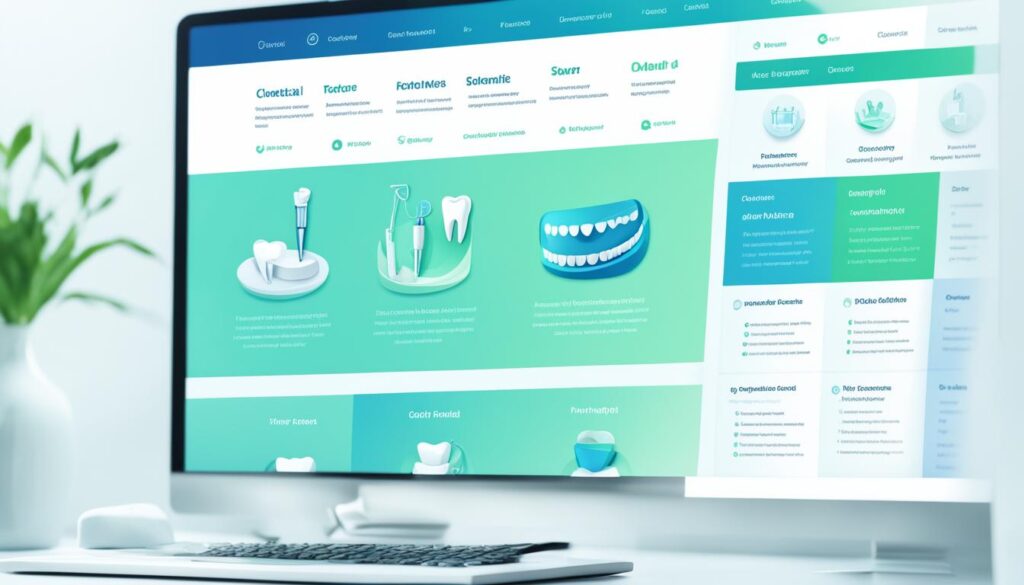
As a dental practice owner, you understand the importance of attracting more patients to grow your business. In today's digital age, having a strong online presence is crucial for success. This is where search engine optimization (SEO) comes into play. By implementing effective SEO strategies, you can boost your practice's rankings on search engine results pages, attract more patients, and ultimately increase your revenue.
SEO for dentists involves optimizing your practice's website to make it more visible to search engines like Google. When potential patients search for dental services in your area, you want your practice to appear at the top of the search results. This means optimizing your website with relevant keywords, creating high-quality content, and building authoritative backlinks.
Key Takeaways:
- Implementing SEO strategies can help your dental practice boost its rankings on search engine results pages.
- Optimizing your website for local SEO is particularly important for attracting patients from your local area.
- On-page optimization involves optimizing various elements on your website, such as page titles and meta descriptions.
- Building high-quality backlinks from reputable websites can improve your practice's visibility and authority in search engines.
- Investing time and effort into SEO can lead to long-term benefits for your dental practice, attracting more patients and helping you stand out from the competition.
Importance of Local SEO for Dentists
Local SEO plays a crucial role in the success of dental practices, especially considering that the majority of patients come from their local area. By optimizing their websites for local search, dentists can effectively target their local audience and attract more potential patients. Let's explore the significance of local SEO and how dentists can leverage it to enhance their online presence.
Targeting the Local Audience
Unlike other businesses, dental practices heavily rely on catering to the needs of their local community. By implementing local SEO strategies, dentists can specifically target potential patients in their area and increase their chances of attracting local traffic to their website. This enables dentists to establish themselves as the go-to choice for dental services in their locality.
Focusing on Local Keywords
A critical aspect of local SEO for dentists involves optimizing their website content with keywords that have local intent. For example, incorporating location-specific terms like "best dentist in [city]" or "affordable dental services in [neighborhood]" can significantly improve search engine visibility. By researching and implementing relevant local keywords, dentists can ensure that their website appears in search results when local users are actively seeking dental services.
NAP Consistency and Accuracy
Another vital element of local SEO is ensuring accurate and consistent NAP (Name, Address, Phone number) information across various online directories. This includes popular platforms like Yelp, Yellow Pages, and Google My Business. Maintaining consistency in NAP details helps search engines validate the credibility and legitimacy of a dental practice, ultimately boosting its local search rankings.
Optimizing Google My Business Listing
Google My Business (GMB) is an essential tool for local SEO, particularly for dentists. By claiming and optimizing their GMB listing, dentists can provide comprehensive information about their dental practice, such as working hours, contact details, and customer reviews. This creates a strong online presence on Google Maps and increases the chances of appearing in the coveted "Local Pack" of search results.

"Local SEO is the key to connecting with potential patients in your area. By focusing on local keywords, maintaining accurate NAP information, and optimizing your Google My Business listing, you can improve your search engine visibility and attract the right audience."
By prioritizing local SEO, dentists can significantly enhance their online visibility and reach their target local audience. The next section will delve into on-page optimization techniques that further improve dental website rankings and drive organic traffic.
On-Page Optimization Techniques for Dental Websites
On-page optimization plays a crucial role in improving the visibility and rankings of dental websites. By optimizing various elements on their websites, dentists can enhance their online presence and attract more organic traffic. Here are some effective on-page optimization techniques:
Optimize Page Titles and Meta Descriptions
Page titles and meta descriptions are the first things that users see in search engine results. It is important to optimize them with relevant keywords to improve click-through rates and search engine rankings. Craft compelling titles and descriptions that accurately represent the content on each page.
Utilize Heading Tags and URL Structures
Heading tags (H1, H2, H3) not only help users navigate through your website but also provide search engines with a clear hierarchy of information. Incorporate relevant keywords in your heading tags to improve keyword relevance. Additionally, create user-friendly URLs that are concise and descriptive, incorporating relevant keywords.
Incorporate High-Quality, Informative Content
Creating high-quality content that is relevant to dental services and procedures is essential for improving search engine rankings. Write informative blog posts, articles, and service pages that answer common patient questions and provide valuable insights. By offering valuable content, you establish authority in your niche and attract more visitors to your website.
Optimize Loading Speed and Mobile Responsiveness
A fast-loading website not only improves user experience but also contributes to better search engine rankings. Optimize your website's loading speed by minimizing file sizes, optimizing images, and leveraging browser caching. Additionally, ensure that your website is mobile-responsive, as an increasing number of users access the internet through mobile devices.
Implement Structured Data Markup
Structured data markup provides search engines with additional context about the content on your website, helping them understand and display it more accurately in search results. Implement structured data markup for dental specific information such as office hours, contact details, and patient reviews. This can enhance the visibility of your website in search results.
Remember, on-page optimization is an ongoing process. Continuously monitor and analyze your website's performance, making necessary adjustments to improve your search engine rankings and attract more patients.

| On-page Optimization Techniques | Benefits |
|---|---|
| Optimizing page titles and meta descriptions | Improved click-through rates and search engine rankings |
| Utilizing heading tags and URL structures | Clear information hierarchy and improved keyword relevance |
| Incorporating high-quality, informative content | Established authority and increased website traffic |
| Optimizing loading speed and mobile responsiveness | Enhanced user experience and improved search engine rankings |
| Implementing structured data markup | Enhanced visibility in search results |
Building High-Quality Backlinks for Dental Practices
Building high-quality backlinks is an essential off-page SEO technique that can significantly improve the visibility and authority of dental practices in search engines. By acquiring authoritative backlinks from reputable websites, dentists can enhance their online presence and attract more potential patients.
One effective way to build backlinks is by creating and promoting informative and shareable content. Dentists can create blog articles or infographics that provide valuable insights into dental health or explain different procedures. By offering valuable content, other websites in the dental industry or related fields will be more likely to link back to the dentist's website, thus establishing high-quality backlinks.
"Creating engaging and informative content that other websites find valuable is key to achieving high-quality backlinks."
In addition to content creation, dentists should also consider engaging with local dental associations and directories. These organizations often have online directories where dentists can list their practice. Getting listed in reputable directories can not only provide valuable backlinks but also help potential patients find the dental practice more easily.
Another strategy to acquire authoritative backlinks is by collaborating with industry influencers. Dentists can reach out to dental professionals or social media influencers who have a significant following and offer to contribute guest articles or participate in interviews. These collaborations can provide valuable backlinks and also enhance the dental practice's reputation and credibility within the industry.
The quality and relevance of backlinks are paramount in determining their impact on search engine rankings. It's crucial for dentists to focus on acquiring backlinks from websites that are trusted, relevant to the dental industry, and have a good reputation. A few high-quality backlinks from reputable sources can be more valuable than numerous low-quality backlinks.
By investing time and effort in building high-quality backlinks, dental practices can significantly improve their online visibility, attract more patients, and establish themselves as trusted authorities in their field.
Benefits of Building High-Quality Backlinks
Building high-quality backlinks offers several benefits for dental practices:
- Improved Search Engine Rankings: Backlinks from reputable websites signal to search engines that the dental practice is trustworthy and authoritative, resulting in higher rankings in search engine results pages.
- Increased Website Traffic: Backlinks from external websites drive referral traffic to the dental practice's website, exposing it to a wider audience and potentially attracting more patients.
- Enhanced Online Reputation: High-quality backlinks from respected sources improve the dental practice's reputation and credibility within the industry, building trust with potential patients.
- Better Conversion Rates: Highly relevant backlinks lead to targeted traffic, increasing the likelihood that visitors will convert into actual patients of the dental practice.
Overall, building high-quality backlinks is a valuable SEO strategy that can yield significant long-term benefits for dental practices. By creating informative content, engaging with local associations and directories, and collaborating with industry influencers, dentists can improve their online visibility and attract more patients.
Conclusion
Implementing effective SEO strategies is crucial for dental practices looking to improve their online visibility and attract more patients. By focusing on local SEO, optimizing their websites for better search engine rankings, and building high-quality backlinks, dentists can enhance their online presence and stand out from the competition. Investing time and effort into SEO can lead to long-term benefits for dental practices, helping them grow their patient base and achieve success in the digital landscape.
When it comes to SEO for dentists, targeting local search is essential. By optimizing their websites with location-specific keywords and ensuring accurate NAP information across directories, dentists can increase their visibility among local searchers. This can drive more website traffic and attract potential patients in their area.
In addition, on-page optimization techniques play a significant role in improving search engine rankings for dental websites. Dentists should optimize elements like page titles, meta descriptions, heading tags, and URL structures with relevant keywords. Including informative and relevant content about dental services and procedures can also help dentist websites rank higher in search results.
Furthermore, building high-quality backlinks is crucial for improving a dental practice's visibility and authority in search engines. Dentists can achieve this by creating valuable content that other websites find shareable and link back to. Engaging with local dental associations, directories, and industry influencers can also help in acquiring authoritative backlinks.
FAQ
Why is SEO important for dental practices?
SEO is crucial for dental practices as it helps increase their online visibility and attract more patients. By implementing effective SEO strategies, dentists can improve their rankings on search engine results pages and drive organic traffic to their websites.
Why is local SEO important for dentists?
Local SEO is particularly important for dentists as the majority of their patients come from their local area. By targeting local SEO, dentists can increase their visibility among local searchers, leading to more website traffic and potential patients.
What is on-page optimization?
On-page optimization involves optimizing various elements on a dental website to improve its visibility and rankings. This includes optimizing page titles, meta descriptions, heading tags, and URL structures with relevant keywords. Additionally, incorporating high-quality, informative content that is relevant to dental services and procedures can also help improve search engine rankings.
How can dentists build high-quality backlinks?
Dentists can build high-quality backlinks by creating informative and shareable content, such as blog articles or infographics, that other websites find valuable and are willing to link back to. Engaging with local dental associations, directories, and industry influencers can also help in acquiring authoritative backlinks.
How can effective SEO strategies benefit dental practices?
Implementing effective SEO strategies can benefit dental practices by enhancing their online presence and helping them stand out from the competition. By focusing on local SEO, optimizing their websites for better search engine rankings, and building high-quality backlinks, dentists can improve their online visibility, attract more patients, and achieve success in the digital landscape.











